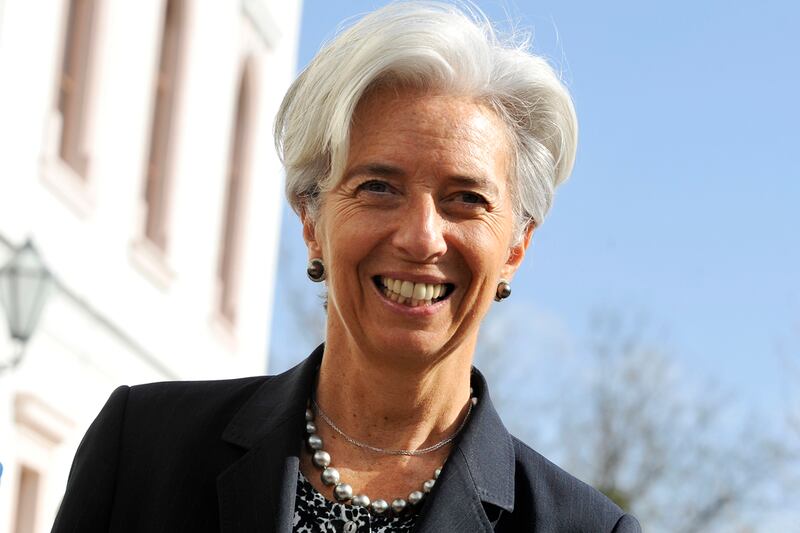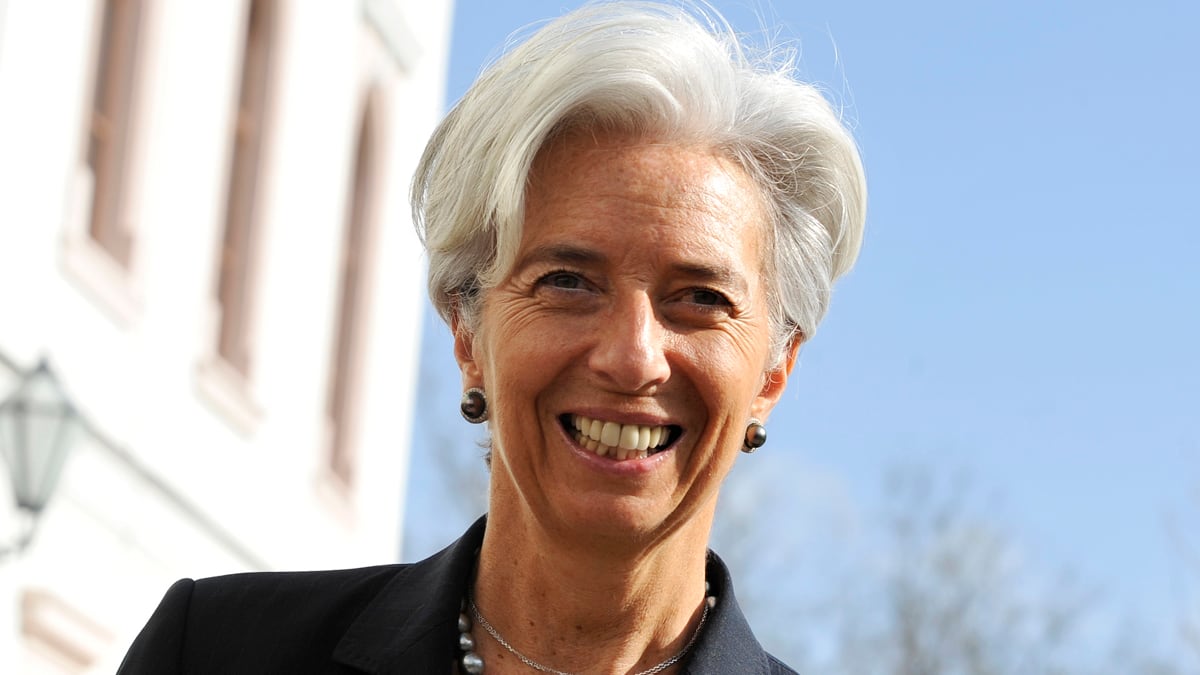It's official. France's Christine Lagarde is the new managing director of the International Monetary Fund. Unofficially, she is now arguably the most powerful woman in the world. The IMF had until Thursday to name a successor to her compatriot, Dominique Strauss-Kahn, awaiting trial in New York for the alleged attempted rape of a Guinean chambermaid on May 14. But the IMF's board made short work of picking Lagarde, the first woman to hold the post.
Lagarde, 55, has gotten used to the "first woman" tag. She was the first woman finance minister for France, and indeed for any G-8 economy, when she was promoted in 2007. And she was the first woman elected to chair Chicago-based corporate law firm Baker & McKenzie, one of the world's largest, in 1999. Indeed, Lagarde even has experience stepping in to help turn an institution's image around after testosterone-fueled disaster. In 1994, a San Francisco court ruled against Baker & McKenzie in a highly embarrassing sexual harassment suit, putting a boorish workplace culture under a microscope the way the Strauss-Kahn incident has today at the IMF. The firm was ordered to pay $7 million (later cut to $3.5 million on appeal) in punitive damages to Rena Weeks, a secretary in the Palo Alto office, for knowing about and failing to stop the behavior of partner Martin Greenstein. Weeks alleged Greenstein, among other inappropriate behavior, touched her breasts as he poured M&Ms into her blouse pocket. Six female secretaries testified against Greenstein, who had a habit of proposing they go “hot-tubbing” with him. He had been transferred to Palo Alto from Chicago, where one witness stated he once crawled under a table in the law library to tickle her feet. The year after Baker & McKenzie lost the suit, Christine Lagarde was elected to the firm's executive committee, its only woman. Four years later, she was elected chair; 91 percent of the partners voting were men.

Lagarde is used to being the standout in a boys' game. Slim and silver-haired, 5' 11", favoring skirt suits, silk scarves and broaches, one beat reporter jokes that Lagarde makes G-8 finance minister meetings look like Snow White and the Seven Dwarfs. Before financial meltdown brought such ideas further into the mainstream, Lagarde would point out how companies with more female representation yielded better bottom lines. “I don’t want to go into the war of testosterone versus estrogen,” she told Newsweek in 2006, when she was still junior minister for trade. “But there is a little bit of that, where males have to sort of show-off and do a bit of posturing and do all this sort of hairy-chested type of stuff that is not as strong in women.”
(As it happens, when French President Nicolas Sarkozy sets out in the coming hours to reshuffle his cabinet to replace Lagarde–an impressive four years in the job, after France had shuffled through eight finance ministers during the previous decade–he will also be filling a second post. Disgraced junior minister Georges Tron stepped down a month ago. A suburban mayor and reflexology fanatic who liked to practice on the female employees in his town hall office, Tron is facing rape charges.)
As a legal executive jetting between time zones and the far-flung offices of a massive multinational, Lagarde's round-the-clock and round-the-world career got the better of two marriages. But she has always said she made a point of calling her young boys twice a day, before school and before bed, no matter what time she had to set her alarm. Today, Thomas, 23, is an architecture student who will move to Chicago for school next year, and Pierre Henry, 25, works for Apple in Paris.
Lagarde's partner is Xavier Giocanti, 56, a gregarious and ruggedly handsome Marseille businessman of Corsican descent, an opposites-attract match for an elegant and understated woman raised on the Normandy coast. Giocanti and Lagarde met teaching law at Nanterre University 30 years ago before losing touch. But it was “pretty much love at first sight,” Lagarde told Paris Match, when they met again in 2006. Giocanti has lived in Marseilles throughout their relationship, the couple meeting up on weekends, often on the Mediterranean Coast where they scuba dive. The Gare de Lyon, where high-speed trains race between Paris and Marseilles in three hours, is a block from Lagarde's finance ministry. But the commute to Washington isn't so convenient, and the couple hasn't let on whether Giocanti will join the IMF's new managing director stateside.
A teenage synchronized swimming champ, Lagarde still maintains athletic – even ascetic – discipline; she's a vegetarian, practices yoga, and won't touch a drink. She earned the respect of peers with her lucid calm through overnight sessions as she helped negotiate the European banking system back from the brink of collapse in the fall of 2008. Still, her heroics did take some cognitive toll. One morning in September 2008, walking out of the Elysée Palace, she broke into a fit of laughter, she told her biographers Cyrille Lachèvre and Marie Visot, at the sight of the black velvet slippers on her feet. Lagarde had forgotten to put her shoes on before the 10-hour negotiating marathon and dawn presidential debrief. No one else had noticed either.
Lagarde's recent IMF leadership campaign saw her travel 31,000 miles in the space of 12 days. She traveled to Brazil, India, China, Saudi Arabia, and Egypt to rally those nations' support to her cause, and met with a flurry of African finance ministers at an African Development Bank meeting in Lisbon. Lagarde weathered some late opposition from Canadian and Australian leaders who backed her only rival, Mexican Central Bank chief Agustin Carstens, last week, echoing Latin American support. The late dissent made it a race on form, but as Canada's Globe & Mail newspaper noted, “An earlier intervention by Canada and Australia might have given Mr. Carstens more momentum. Their decision to make their announcement at 6 p.m. on a Friday in Ottawa suggests this might be little more than 11th-hour showboating.” Meanwhile, the Chileans, who supported Carstens, went so far as to courtesy-call Lagarde personally to explain their position.
Now for Lagarde, it is Next Stop: D.C. And if she has her way, the end of the hairy-chested stuff.




